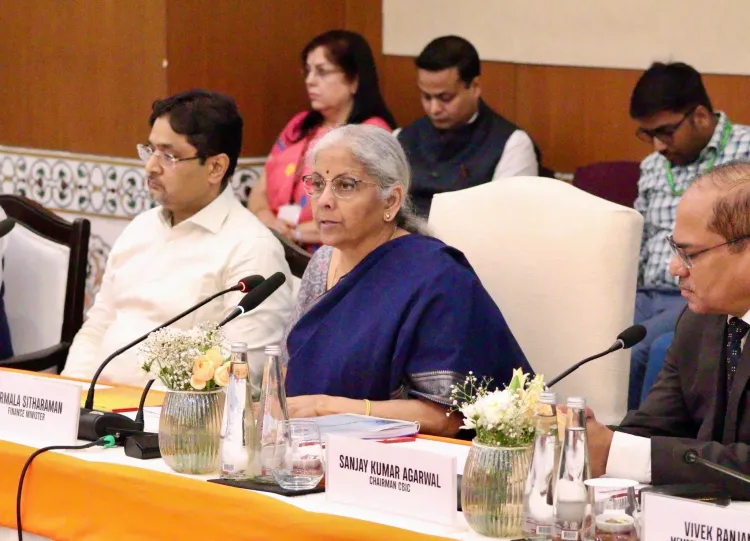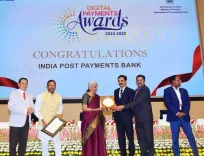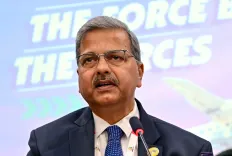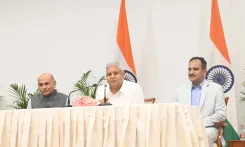How is FM Sitharaman Planning to Simplify GST Registration and Tackle Tax Evasion?

Synopsis
Key Takeaways
- GST registration process aims to be simplified and transparent.
- CBIC directed to speed up investigations for Customs and CGST cases.
- Focus on reducing tax evasion and improper ITC claims.
- Dedicated helpdesks for taxpayers to assist with GST applications.
- Enhancing support at GST Seva Kendras and Customs Turant Suvidha Kendras.
New Delhi, June 20 (NationPress) Finance Minister Nirmala Sitharaman has urged the Central Board of Indirect Taxes and Customs (CBIC) to enhance the simplicity of the GST registration process. She emphasized the need for rapid resolution of investigations concerning Customs and CGST matters, while also focusing on curbing tax evasion and preventing improper Input Tax Credits (ITC).
In her address at the CBIC conclave, she instructed field formations to accelerate the resolution of grievances and efficiently manage public complaints received via CPGRAMS, while also shortening the dwell time for imports.
The Finance Minister called on zonal commissioners to formulate an action plan aimed at enhancing several aspects, including GST registration, refund processing, and taxpayer grievance management.
She highlighted the importance of making the GST registration process more user-friendly, seamless, and transparent for taxpayers, leveraging technology and risk-based parameters.
Sitharaman also urged the CGST formations to initiate targeted outreach campaigns aimed at educating taxpayers, trade associations, and industry entities about the essential documentation for GST registration, especially concerning the principal place of business. This initiative aims to minimize rejections and delays in registration and facilitate quicker processing of applications. Additionally, she recommended that CGST zonal heads establish dedicated helpdesks to assist taxpayers throughout the registration process.
She underscored the necessity for GST Seva Kendras and Customs Turant Suvidha Kendras to be adequately staffed, accessible, and well-maintained, ensuring that taxpayers receive timely and effective support.
The Finance Minister also called for prompt conclusions of investigations related to Customs and CGST cases, emphasizing the need for an analysis on detection and recovery while seeking ways to close the gap between detection and recovery. Simultaneously, she stressed the importance of preventing tax evasion and improper Input Tax Credits (ITC).
She urged the CBIC to expedite the processing of GST and Customs refunds to facilitate timely resolutions and enhance the ease of doing business, particularly for MSMEs and exporters.
On the inaugural day of the CBIC Conclave, Union Minister of State for Finance Pankaj Chaudhary spoke and introduced the ICETAB device for export examinations, which aims to lower transaction costs and turnaround times for trade, thereby enhancing India’s position in the Logistics Performance Index (LPI).
During the conclave, presentations showcased the performance metrics of Customs and CGST zones on critical indicators. It was noted that the average grievance resolution time has been reduced to just 9 days, significantly better than the designated 21-day timeline.
The national average for GSTR-3B filing stood at 94.3 percent for FY 2024–25, with 85 percent of refund claims processed within the required 60-day timeframe.
Furthermore, the detection of GST evasion surged to ₹2,23,170 crore for FY 2024–25, with voluntary payments amounting to ₹28,909 crore. Remarkably, the number of taxpayers audited more than once in three years is zero.
The Finance Minister encouraged Customs to reduce dwell time at seaports, airports, and Inland Container Depots (ICDs) for both imports and exports, asserting that quicker cargo clearance is vital for improving India’s competitiveness in global trade and easing business operations.
Addressing outstanding disciplinary issues, the Finance Minister instructed that disciplinary proceedings against officials at various levels be resolved promptly and within a set timeframe.
The CBIC was also urged to promptly fill all vacant positions across different levels to bolster field formations and enhance administrative efficiency.
Sitharaman encouraged Chief Commissioners and DGs to actively implement trade facilitation measures within their jurisdictions and to provide actionable recommendations to the CBIC Headquarters for further streamlining processes.









